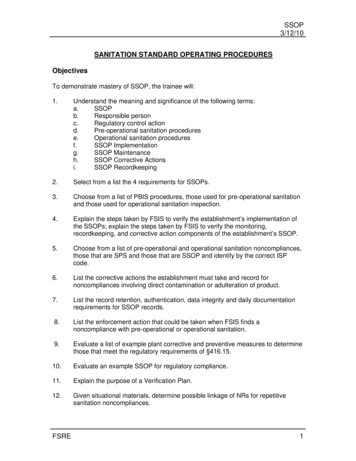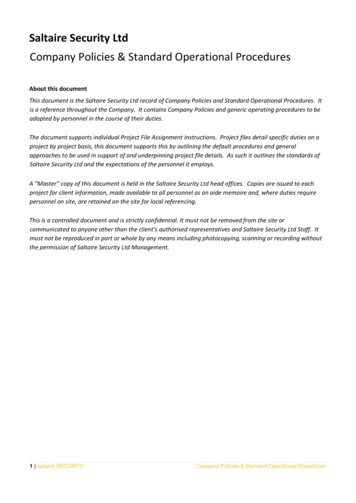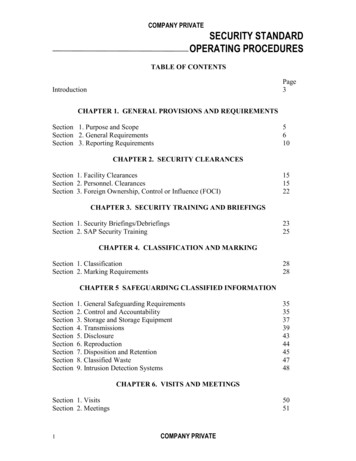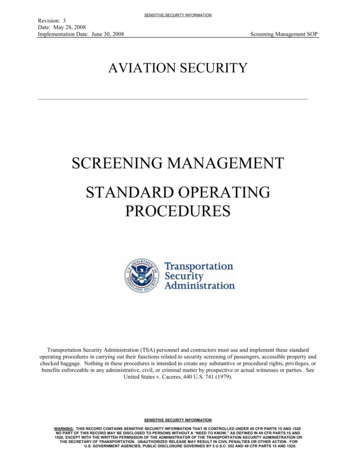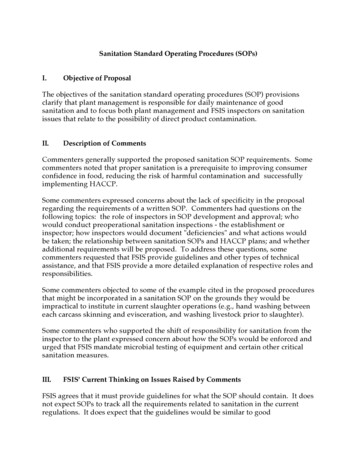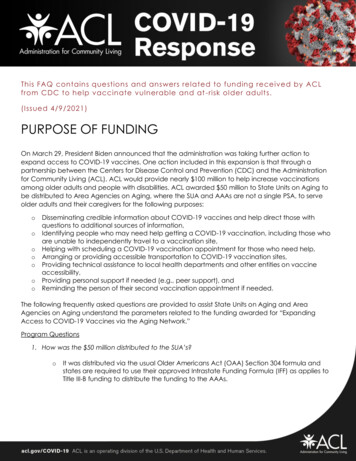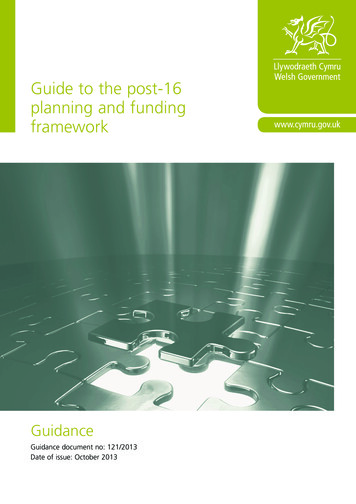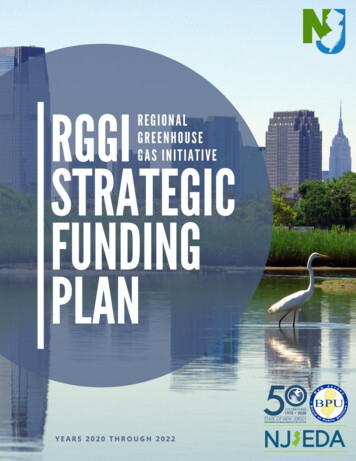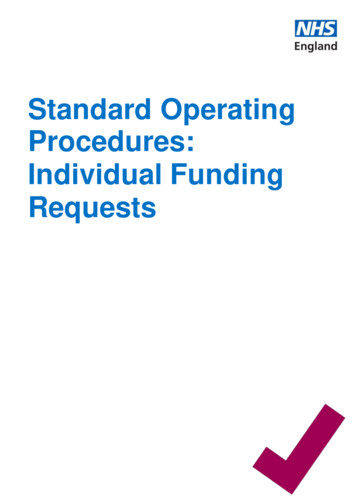
Transcription
Standard OperatingProcedures:Individual FundingRequests1
NHS England INFORMATION s and InformationTrans. & Corp. Ops.Publications Gateway Reference:Specialised CommissioningStrategy & Innovation08096Document PurposePolicyDocument NameStandard Operating Procedures: Individual Funding RequestsAuthorSpecialised Commissioning TeamPublication Date22 May 2018Target AudienceCCG Clinical Leaders, Care Trust CEs, Foundation Trust CEs , MedicalDirectors, Directors of PH, Directors of Nursing, NHS England RegionalDirectors, NHS England Directors of Commissioning Operations,Directors of Finance, NHS Trust CEs, Those responsible for theoperation of the IFR process and related decision making, as well ashealthcare professionals who wish to apply for treatments under the IFRpolicy.Additional CirculationListDescriptionThis publication is an update of the existing published standardoperating procedure for the management of individual funding requests(IFRs) and outlines how the process for managing IFRs for NHSEngland will operate.Cross ReferenceSuperseded Docs(if applicable)Action RequiredTiming / Deadlines(if applicable)Contact Details forfurther informationN/ANoneNoneSpecialised Commissioning TeamNHS EnglandSkipton House80 London RoadSE1 ent StatusThis is a controlled document. Whilst this document may be printed, the electronic version posted onthe intranet is the controlled copy. Any printed copies of this document are not controlled. As acontrolled document, this document should not be saved onto local or network drives but shouldalways be accessed from the intranet.
Standard Operating Procedures: Individual Funding RequestsVersion number: 4First published: April 2013Second publication: February 2016Third publication: November 2017Fourth publication: May 2018Prepared by: NHS EnglandClassification: OFFICIALThis policy will apply to individuals eligible for NHS services in England only where NHS England isthe responsible commissioner.3
ContentsContents . 4Standard Operating Procedure statement . 5Equality and Health Inequalities statement. 5Introduction . 6The IFR Process. 8Review of IFR Panel Decisions . 14Monitoring and reporting of the IFR Process . 16Appendix One – NHS England IFR Application Form. 17Appendix Two – Terms of Reference IFR Screening Group. 25Appendix Three –Individual Funding Request (IFR) Reconsideration Form . 28Appendix Four – Pre-Panel Screening Document . 30Appendix Five – Terms of Reference IFR Panel . 34Appendix Six – IFR Panel Decision Framework Document . 37Appendix Seven – Funding for Continuation Requests . 47Appendix Eight – Terms of Reference – IFR Review Panel . 514
Standard Operating Procedure statementThis document sets out how the process for managing individual funding requests (IFRs) for NHSEngland Prescribed Services will operate. Such requests are managed in line with the NHS EnglandIFR Policy.This updated version reflects any revisions to the NHS England IFR policy made as a result of publicconsultation.Equality and Health Inequalities statementPromoting equality and addressing health inequalities are at the heart of NHS England’s values.Throughout the development of the policies and processes cited in this document, we have: Given due regard to the need to eliminate discrimination, harassment and victimisation, toadvance equality of opportunity, and to foster good relations between people who share arelevant protected characteristic (as cited under the Equality Act 2010) and those who do notshare it; and Given regard to the need to reduce inequalities between patients in access to, and outcomesfrom healthcare services and to ensure services are provided in an integrated way wherethis might reduce health inequalities5
IntroductionIndividual Funding Requests for NHS England Prescribed Services1.This document sets out how the process for managing individual funding requests (IFRs)for NHS England Prescribed Services will operate. The intended audience is thoseresponsible for the operation of the IFR process and related decision making. It will alsobe of interest to those wishing to apply for funding of treatments under the IFR policy. Itshould be read in conjunction with the following NHS England commissioning policies: NHS England Commissioning Policy: Individual funding requests NHS England Ethical Framework (NHSCB/CP/O1) NHS Commissioning Policy: Funding for clinical trials and after completion of a clinicaltrial NHS England Commissioning Policy - Specialised Services Service Development Policy2.NHS England is the statutory body responsible for the consideration of IFRs for directlycommissioned, Prescribed Services in England. These include specialised services (SS), allhealth services for the Armed Forces (AF), Health and Justice (H&J), and secondary careDentistry. The policies listed above describe the underpinning NHS England policyframework which will apply to the management of Prescribed Services IFRs, with theexception of the Service Development Policy which relates to specialised services only.Treatments submitted for consideration of funding as IFRs inform national clinicalcommissioning policy development.3.There is a single process for the operational management of all Prescribed Services IFRs.This process is the remit of an IFR administrative team for NHS England which isgeographically distributed but flexible and responsive to requests and enquiries on anational basis. Decisions are made at each stage of the process by a nationallyrepresentative IFR Screening Group, IFR Panel and IFR Process Review Panels. Membersparticipate on a rota basis promoting consistency and equity in decision making.Deciding when NHS England is the responsible commissioner4.The following criteria will be used to assess whether a treatment/service and its indicationfor use are the commissioning responsibility of NHS England: Is the treatment for which funding is requested associated with a service, treatment or apatient group described as the commissioning responsibility of NHS England in thepublished Manual for Prescribed Specialised Services, the associated IdentificationRules documents, a published NHS England Clinical Commissioning Policy or ServiceSpecification? Is the patient for whom the treatment/service is requested one of the groups of patients(AF and H&J) for whom NHS England directly commissions services? Is the treatment for secondary care Dentistry?6
5.If any of the above applies, NHS England is the responsible commissioner. Prescribedservices are commissioned by NHS England for patients eligible for NHS treatment inEngland.6.The Standard Operating Procedures (SOP) do not cover IFRs for treatments and serviceswhich are the commissioning responsibility of Clinical Commissioning Groups (CCGs). Theseorganisations commission services for their population. Close working relationships betweenNHS England and CCG IFR Teams will ensure that requests for Prescribed Services andCCG commissioned services are directed appropriately.IFR timescales and urgent cases7.The standard period for providing a substantive response to an IFR (i.e. a decision on thefunding request) is a maximum period of 30 working days from the date of the receipt of afully completed IFR form to the date the requesting clinician is informed of the outcome(inclusive).8.This 30 working day period discounts any working days where the IFR team are awaitinginformation sought from the requesting clinician. At any point in the IFR process, the IFRteam can ask for further information to clarify the request. If the requester does not provide aresponse to the IFR team within 10 working days the request record will be closed and therequester informed. Such a request can be reopened on submission of the additionalinformation.9.IFRs must be considered carefully and with the benefit of all the required information.Clinicians are encouraged to submit IFRs in a timely manner which has regard to thestandard decision-making timescale set out above. As far as possible clinicians should avoidwaiting until a case becomes clinically urgent before submitting an IFR. In this context,references to clinical urgency are to risks of adverse clinical outcome to the individual patientif a decision on the IFR is not provided within a 20 working day timescale. These risks shouldbe made explicit in the application together with the reason that the application has not beenmade earlier. The IFR team will endeavour to prioritise urgent requests proportionately totheir degree of urgency but it must be appreciated that for every patient whose application isfast tracked another patient's application is delayed. Not every request for urgentconsideration can be complied with, which underscores the need for timely applications tobe made whenever possible.10.Under the national framework for the management of IFRs which this document outlines,screening of IFRs will be undertaken on 4 days each week and the national IFR panel willmeet usually three times per month.11.NHS England makes funding decisions in line with the IFR policy however, the clinicalresponsibility and decision to treat a patient lies with the treating clinician and/or the Trust. If,pending the outcome of any IFR application, a patient is presenting as clinically urgent,clinicians should seek advice from their Medical Director.12.Should a decision be made by the provider to start treating a patient due to clinical urgency,and an IFR application is still desired, a completed IFR application must be submitted to theIFR team within two working days of the intervention first taking place. The IFR team will notprocess applications that fall outside of this timeline. If the IFR has been received within thistimeline and the IFR Panel subsequently supports the funding of the IFR request, treatmentfunding will be back dated to the date on which the application was made. Costs will not bereimbursed if the IFR Panel decline the request.7
The IFR ProcessAdministrative pre-screening13.The standard NHS England IFR application form must be used for all requests. Therequest will not be progressed if not completed on an NHS England IFR form. This formcan be found at Appendix One and is also available in MS Word format alongside thepublished IFR policy and guidance for clinicians online. The MS word version should besubmitted (and PDF copy with signatures if necessary) to the IFR team.14.Submissions on IFR forms from other commissioning organisations cannot progressthrough the NHS England IFR process. This is to ensure that all NHS England IFRrequests contain the same depth and range of information and so can be equitablypresented for consideration. If a request for funding a treatment which is an NHS Englandcommissioning responsibility is not submitted on the NHS England IFR form the requesterwill be asked to resubmit using this form.15.Every section in the IFR form needs to be completed in full in order for the request toprogress. Any request form which is incomplete will be returned to the requester forcompletion and the application will not progress any further until completed andresubmitted.16.IFR forms must be received as typewritten only. Handwritten IFRs will be returned to therequester for amendment. This is to ensure that all content is legible and the best casemade on behalf of the patient.17.A request must come from a healthcare professional directly involved in the care of thepatient. This should be the most senior clinician responsible for the care of the patient usually atconsultant level and should be the clinician with responsibility for delivering the proposedtreatment. For all Prescribed Services, including non-specialised treatments for specifiedpopulations, there will be a lead clinician offering the treatment requested.18.The request must come from a provider who is contracted by NHS England to provide theservices which are the subject of the IFR. Providers who are not so contracted will beadvised to make an appropriate referral to the relevant specialised centre who can considerwhether an IFR is necessary.19.General Practitioners who request Prescribed Services treatments will be advised tomake a referral to an appropriate clinician within a specialised provider. The IFR will notprogress at this point until that is undertaken.20.Requests will not be accepted from a patient or their non-clinical representative. This is fortwo reasons. Firstly, it is because it is unlikely that the patient would be in possession of thetechnical clinical detail that is necessary for consideration of the case and secondly, theprocess is to enable an NHS clinician to apply for funding to support the provision of NHStreatment by that clinician to the patient.21.The patient / patient's representative or guardian can submit information in support of therequest. A patient representative is a person who has the legal authority to take decisionsabout medical care and treatment on behalf of a patient who lacks capacity to take thesedecisions themselves. Such information can only be considered if it relates to the patient’sclinical circumstances. Non-clinical factors cannot be taken into account. This is described inmore detail in the IFR Policy, and should not be submitted.8
22.Unless the following paragraph applies, the requesting clinician should complete the consentsection of the form to confirm that the patient is aware of the application and has agreed totheir personal clinical information being shared. The NHS England guide ‘Individual fundingrequests – information for patients’ should be given to patients as part of the consentprocess to ensure that the patient has received sufficient information to support informedconsent.23.If the requesting clinician considers that the patient does not have capacity to give informedconsent this should be indicated and explained in the IFR form. In these circumstances thesubmission should also confirm whether consent has been obtained instead from a patientrepresentative and, if not, the basis on which the IFR is nevertheless being made by theclinician. Submissions which do not include either confirmation of appropriate informedconsent by the patient or a patient representative, or a satisfactory clinical explanation as towhy the application is being made without consent cannot be processed and must bereturned for amendment.TO NOTE: An online application process is currently being developed and will be launched at afuture date. This SOP will be updated to provide information on how applications should besubmitted in that new process.24.Trust support is a mandatory section of the application form. The application will not progressin the absence of this support. Requests should be supported by a relevant multidisciplinaryteam (MDT) or trust Drugs and Therapeutics Committee (DTC), Chief Pharmacist (orDeputy) where funding for medicines are requested AND by the provider trust MedicalDirector/Deputy Medical Director. It is mandatory to provide copies of the MDT/DTC minutesof the discussion to the IFR team, alongside the application. For drug requests the Chief /Deputy Chief Pharmacist must also support the application.25.IFR applications should be supported by published electronic copies of the clinical researchevidence papers or other supporting documents (e.g. Trust Guidance or supporting clinicalletters). Evidence should directly support the use of the requested treatment for thecondition in cases such as the patient in question, and the requesting clinician shouldhighlight links between the evidence submitted and the particular patient circumstances .Evidence should be submitted as pdf or word documents. The IFR team are unable toaccept abstracts or web links.26.If a request for prescribed services for AF, H&J populations or for secondary care dentistry issubmitted to the IFR team, they will refer it to the relevant commissioning teams to ensurethat appropriate pre-screening by those commissioners has been carried out. Requestingclinicians will be informed of this and the IFR will not proceed at this stage. Separatearrangements for considering funding for AF and H&J populations are available. NHSEngland Health and Justice and Armed Forces service specific policies are available at:www.england.nhs.uk/commissioning/policies/ssp/. Requests relating to secondary caredental services should be directed to the local NHS England Hub office dental team in thefirst instance.27.If a request for treatment that is not the commissioning responsibility of NHS England isreceived, the requester will be advised accordingly and the case record closed.28.The IFR team will consider whether existing directly commissioned services would cover therequested treatment. If commissioning arrangements exist the IFR team will assess whetherthe requested treatment specifically falls outside the relevant commissioning criteria. The IFRteam will be supported in this by commissioning and clinical colleagues e.g. SpecialisedCommissioning Programme of Care (POC) Leads, AF, H&J and secondary care dentistryleads, Pharmacists, Public Health, Supplier Managers, Service Leads and Clinical Reference9
Groups (where required). W here commissioning arrangements exist which may apply to thepatient the request will be returned to the requester with advice to review the case against thecommissioning arrangements and will not progress further as an IFR until this is completed.29.If an IFR meets all requirements to be able to proceed as an IFR, the IFR team will begin tocomplete the Pre-Panel Screening Document. This document will be the mechanism forrecording and sharing information with decision makers at each stage of the IFR process. Itforms a record of the outcome of screening and will detail the explicit reasons for theoutcome.The Screening Group30.Completed IFRs, all supporting documents and the Pre-Panel Screening Document will beprocessed by the IFR team and authorised senior health professionals (the Screening Group)as set out in the IFR Policy. A national pool of screeners will contribute to Screening Groupmeetings on a rota basis by teleconference. These will usually include the IFR team, PublicHealth England Public Health Consultants and Specialists and Pharmacy Leads.Representatives for AF, H&J and Dental will join the Screening Group for cases relating totheir commissioning responsibilities. All the documents will be made available to theScreening Group without patient identifiers to protect confidentiality and minimise thepotential for identification bias. This will include the removal of patient’s name, date of birth,NHS number, the name of requestor, medical director, the requesting Trust and any otheridentified clinicians and organisations. Where an applicant has inadvertently included smallamounts of non-clinical information, this will be redacted by the IFR team prior to screening.Where there are large amounts on non-clinical information included in the form and to redactthe form would materially alter the information in the form, the application will be returned tothe applicant with advice on resubmission.31.The purpose of the Screening Group (Appendix Two – Terms of Reference) is to determinewhether the requester appears to present an arguable case for the clinical exceptionality oftheir patient compared with other patients with the condition. If the screening processdetermines that the request is not a service development (i.e. that patient is not part of a widergroup who could equally benefit from the treatment) and there is sufficient information toconsider the case, the screening group will then determine whether the documentation setsout a clearly presented and arguable basis for how the request meets the IFR policy criteria.32.The Screening Group may also regularly seek scientific and technical information relating tothe natural history and usual course of the condition, the place of the treatment in the patientpathway or the evidence base for the requested treatment. Such advice will be soughtthrough the NHS England clinical advice structure. Any advice received will be shared withthe requester at the same time that the screening outcome is communicated.33.A request will normally be screened and the outcome communicated by NHS England within 10working days of the date of receipt of a completed IFR form. If further information is requiredfrom the requester, the timeline for the request is suspended until this is received.Outcomes at IFR Screening34.The Screening Group will have the following outcomes available to them: If an individual meets the criteria for funding within a NHS England clinicalcommissioning policy or commissioned service, and this is confirmed by the ScreeningGroup the requester should be advised of this and the request does not proceed furtheras an IFR. Clinicians are advised that if they are unsure about whether something is10
commissioned at their trust, they should discuss with their trust contracts team whetherthe treatment is covered by their NHS England contract, in the first instance. To seek further clinical information to clarify specific issues relating to the case from areliable information source. This may be from the requester or from the NHS Englandclinical advice structure at the Screening Group's discretion. Information will only besought at this stage if there is a clear understanding that an answer is necessary for adecision by the Screening Group. If this information is received within 10 working days itwill be considered by the original Screening Group. If it is received after 10 working daysthe request will go to a new Screening Group. To conclude that there is sufficient information for the IFR to be forwarded to the IFRPanel for consideration and an arguable case for exceptionality has been presented.The Pre-Panel Screening Document will be completed with the detail of the screeningoutcome and included as part of the pack of information for the IFR Panel to consider. To conclude that there is sufficient information presented to enable them to reach adecision but that an arguable case on exceptionality has not been presented on thebasis of the criteria for consideration as an IFR (as outlined in the IFR policy). If this isthe case, the Screening Group is required to decline the request without referring thecase to the IFR Panel. Where an IFR is declined by the Screening Group a written response will be sent to therequesting clinician explaining the reasons for the outcome and outlining the options thatare available. This will usually be copied to the patient’s GP. The IFR team will advise relevant applicants (via email) of the status of their applicationwithin 2 working days. The completed letter will be sent within 7 working days of theScreening Group outcome. The patient / parent or patient representative, in accordance with the patient consentarrangements, will be notified of the outcome by receiving a letter. The responsibility fordiscussing the outcome of the funding request and answering any questions which thepatient may have about the request or their clinical options will lie with the requestingclinician. This is because the clinician will have the full details of the reasons for thedecision and will need to share these. The clinician should contact the patient in order todiscuss the outcome and implications for future care. If the Screening Group concludes that the request is either a service development, thereis not sufficient information or evidence the IFR policy does not provide a right for thecase to be considered by the IFR Panel and does not provide a right to request that thescreening outcome should be reviewed by the IFR Process Review Panel. However, therequesting clinician may feel that in the light of the reasons for refusal, there is newclinical information that should be included. If this is so, the case can be reconsidered by theScreening Group.Reconsideration by the Screening Group35.If a requesting clinician believes they have significant new clinical evidence that they did notpreviously provide which they think may have made a difference to the decision made, or ifthe Screening Group sought additional advice through the NHS England clinical advicestructure and the requesting clinician disagrees with that advice, then they can submit thisnew evidence or explain the basis of their disagreement and request reconsideration of theirdecision by the Screening Group. The new clinical evidence or explanation of disagreement mustbe completed on the reconsideration form (Appendix Three. The Screening Group will determine11
if the new information provides a different clinical picture warranting a different screeningoutcome using the reconsideration pre-panel screening document (Appendix Four).36.The Screening Group will determine, normally within 10 further working days, whether theadditional information materially alters the nature and strength of the evidence that wasinitially submitted.37.If a decision is made to refer the case to IFR Panel following reconsideration, the IFR Paneldecision should be communicated within 30 days of the receipt of the reconsiderationrequest.The IFR Panel38.IFR Panel meetings and membership are scheduled in a rolling programme in advance. TheTerms of Reference for the IFR Panel are in Appendix Five.39.When a request is referred for consideration by the IFR Panel, the IFR team will book thecase onto the next meeting date that has time available to consider the case and inform therequesting clinician. The case will be prepared for panel.40.The patient / patient representative, or their clinical or non-clinical representative, is notentitled to attend the panel in person. This is to ensure objective decision making by the IFRPanel in a fair and equitable manner to all patients.41.The IFR team will provide the IFR Panel members with an information pack which will includethe original request form, any supporting documents or correspondence, the Pre-PanelScreening Document and a blank IFR Panel Decision Framework Document (DFD)(Appendix Six) for use during the panel meeting. All the documentations will be madeavailable to the panel completely anonymised and redacted to protect confidentiality andminimise the potential for identification bias.42.A nominated clinical member of the IFR Panel will introduce the case at the meeting. Thepurpose of this case introduction is to present the clinical background and outline technicalclinical factors associated with the case and allow for any clarification required by nonclinical panel members. The presentation will not include their opinion on the clinicalexceptionality of the case in question. The IFR Panel will then discuss the case in relation tothe questions outlined in the IFR Panel DFD and reach a decision on whether funding can beapproved under the IFR Policy.IFR Panel decision making43.The IFR Panel works on behalf of NHS England and makes decisions in respect of fundingfor individual cases. It is not the role of the IFR Panel, by its decisions, to make clinicalcommissioning policy on behalf of NHS England.44.The IFR Panel will apply the criteria in the IFR Policy and the IFR team record the decisionof the IFR Panel against each of the questions on the IFR Panel DFD. The panel will beclear about the rationale for the decision at each stage and this will be recorded in thedocument. A summary statement will be agreed by the IFR Panel and this will supportcommunicating the decision.45.The completed DFD for each case, together with the record of attendance and any generaldiscussion or business of the IFR Panel, will form the business notes of the meeting. Thesewill be agreed and signed off by the Chair and Clinical Director (or deputy) on the IFR12
Panel. Any notes made by individual panel members will be destroyed confidentially afterthe meeting.Outcome at IFR Panel46.The options available to the IFR Panel are to decide: To approve funding if the patient and the treatment requested meet the criteria outlined inthe IFR Policy. Where an IFR is approved the IFR team will require an update on theclinical outcome of treatment from the requesting clinician in order to determine whether ithas resulted in the anticipated level of benefit to the patient. An appropriate review datewill be determined by the IFR Panel and recorded. The IFR system will flag when reviewdates are due. The IFR team will ensure that feedback on outcomes is requested. Thisinformation is essential for the relevant regions when processing requests forcontinuation of treatment. Provider trusts and their clinicians are required to comply withsuch requests for information on the outcome of treatment for their patients, incompliance with the IFR Policy. Funding is conditional on this. (Appendix Seven providesinformation on the process for requesting continued funding for treatment approvedunder an IFR). To decline funding on one of two grounds:o That there is insufficient i
can be found at Appendix One and is also available in MS Word format alongside the published IFR policy and guidance for clinicians online. The MS word version should be submitted (and PDF copy with signatures if necessary) to the IFR team. 14. Submissions on IFR forms from other commissioning organisations cannot progress

